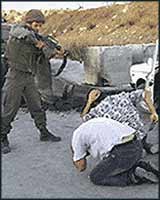Haim Weiss
Haim Weiss, was once glad to serve in the Israeli army. Like hundreds of other Israeli soldiers, he has become a conscientious objector to the war in the Occupied Territories. Here he tells his government’s Defence Secretary why he will not go to the West Bank.
Dear Ben Eliezer,
I must put in writing the reasons that have led me to one of the most difficult decisions of my life - to refuse the call for reserve duty in the areas of Judea and Samaria [the West Bank], and the Gaza Strip.
This decision was difficult for two reasons. First and foremost is a matter of principle: I believe that living in a democracy offers equal parts privilege and obligation, and that it is my duty to adhere to the decisions made by majority rule, barring exceptional circumstances. The second reason is that over many years of reserve duty, I have not only served a very important cause, but also formed close bonds with the soldiers in my company and battalion. It is extremely difficult to imagine them serving on dangerous missions while I sit at home.
Despite this, the current situation leaves me no choice but to refuse. The citizen’s conscience provides a critical foundation for the checks and balances inherent in a democracy. Israel has done more than grant citizens full rights to protest against injustices. By including the concept of “a clearly illegal command” in the code of military law, it has obliged its soldiers to refuse to carry out orders that are immoral or opposed to the values on which a democracy is based.
As I see it, this concept means that when a soldier is issued with a command opposed to his moral values, he must refuse to obey it, report the event, and ensure that such orders will not be repeated. A soldier who does not do so cannot escape being held morally responsible by claiming that he only carried out orders, but can expect to be tried for his actions. This law indicates that the military and the state see the soldier as an autonomous moral being, who must carry out commands only if they pass his moral scrutiny.
The most critical question that arises is “what exactly is an illegal command?” What is immoral as opposed to just inconvenient or unpleasant, and into which category does the current situation in the territories fall?
An order to fire on a child standing before a roadblock is clearly illegal. But if the order is to shoot above his head to chase him from the roadblock, does the emotional damage the shooting causes the child make the order illegal? Is it illegal to continually enter Palestinian citizens’ homes in the middle of the night? Is it illegal to prevent the free movement of Palestinian citizens? Aren’t the searches, the humiliation, our many mistakes, an indication that our treatment of the Palestinian population under our rule is clearly illegal?

Military law does not define what a clearly illegal order is, but leaves it to the soldier. My interpretation of the law does not limit it to orders involving attacking, killing or injuring people. Rather, it includes any command that, when obeyed, leads to humiliating human beings, robbing them of self-respect, and depriving them of the basic human rights protected under the UN declaration of human rights, a document signed by Israel.
I used to believe there was a purpose to my presence in the territories. I believed the solutions I offered would prevent problems. Today, I believe my presence cannot solve those problems and that the orders issued are illegal because they deprive the Palestinian population of its basic rights and freedoms.
Prohibiting Palestinians from travelling along roads without providing alternative routes, the never-ending delays at roadblocks, the many hours required to travel short distances, the humiliation, the destruction of homes, the incessant searches, the need to aim weapons at innocent women and children - all these actions turn the Israeli Defence Force into an immoral occupying force, and in these I refuse to participate.
These actions on the part of the IDF provide no protection to Israel. They protect only the settlements built on conquered territory, where Israel has no right to establish settlements. The friction with the Palestinian population is caused by the need to provide settlers with freedom of movement, not by the need to prevent suicide bombers entering Israeli territory. As long as Israel continues to hold the settlements, it will be forced to act immorally toward the Palestinian population.
In addition to the great harm we are causing daily to Palestinians, we damage ourselves as a society. Our society is based on moral precepts in Judaism, which states that “loved is a person created in God’s image”. Instead, we are raising a generation of violent young people immune to pain and human suffering, a generation who don’t see in the Palestinian a human being, only part of a mass to be avoided and feared. We are raising a generation that stops pregnant women, old people and children from getting to hospital.
I am very sorry that things have reached this point. I would be very glad to serve the IDF on any mission entrusted to us, as long as its objective is not connected with subduing the Palestinian population under our rule.
Sincerely,
Captain Haim Weiss
Haim Weiss, 32, is a captain in the tank corps and served in the IDF for four years during his military service. He is completing a PhD in Hebrew literature at the Hebrew University of Jerusalem.
Article courtesy of The Guardian